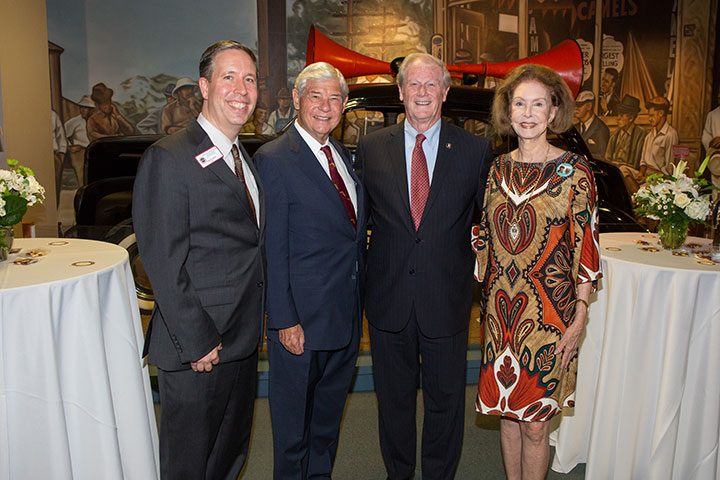
“One of the most gratifying things that I think a man can do, a woman can do, in a career is to have an honorable career in public service, be identified with meaningful legislation that helps people to live better and longer and healthier and happier.”
Those words were uttered by the late Sen. Claude Pepper, a man who represented Florida in the U.S. Senate for 14 years and in the U.S. House of Representatives for 26 years. He was dubbed the “spokesperson for the elderly” for his strong advocacy on behalf of the rights of older Americans.
Three entities inspired by the lifelong work of Pepper — the Claude Pepper Center, the Claude Pepper Foundation and the Pepper Institute on Aging and Public Policy — hosted a program featuring keynote speaker former U.S. Sen. Bob Graham at Florida State University on Thursday, Oct. 12.
The invitation-only crowd honored the legacy of Pepper and also celebrated the 40th anniversary of the Pepper Institute and the 20th anniversary of the Claude Pepper Center.
President John Thrasher introduced Graham, who also served two terms as governor of Florida and former U.S. Senator — and lauded the Pepper Institute for its achievements.
“I want to congratulate the Pepper Institute on Aging and Public Policy on its 40th anniversary,” Thrasher said. “For four decades, you’ve conducted research on aging and the implications it has for society in terms of the economy, health care, family relationships and public policy. This is important work that affects us all because, let’s face it, none of us are getting any younger.”
The Pepper Institute got its start in the early 1970s, when the late William G. Bell, then an associate professor of Urban and Regional Planning, obtained permission to start a program in gerontology to pave the way for a center. In 1977, Bell received funding from the U.S. Administration on Aging to establish the Multidisciplinary Center on Gerontology at FSU.
Over the years the center would encounter changes in leadership, establish a long-standing relationship with the Claude Pepper Foundation and be formerly changed to an institute, ultimately housed in the Claude Pepper Center created in 1997.
Graham recounted a handful of stories that shaped Pepper’s life, legacy and the work taking place today in his name.
“He was a rock star,” Graham said. “You’d go into any audience, general audience, senior audience, educators, whatever grouping it might be and he was overwhelmed. They say in show business you never want to go after a kid’s act or a dog show. I will say in politics you did not want to follow Claude Pepper. That was a dangerous thing to do and would be very dispiriting to your own sense of self-worth.”
Graham’s wife, Adele, also joined in sharing her favorite memory of the longtime public servant.
“I loved Claude Pepper,” she said. “He was such an important part of my life. I was the only first lady in the country to be a registered lobbyist for the elderly. He told me, ‘I will take care of you, I will support you and we’ll do good things together,’ and we did.”
Decades later, the good work continues through the three entities in Tallahassee bearing his name.
The mission of the Claude Pepper Foundation is based upon the principles by which Pepper lived. He devoted his life to reducing poverty, injustice and oppression. He promoted policies and programs to improve health, provide economic opportunity and contribute to the social justice of all Americans with a special emphasis on the betterment of life for older adults.
The Claude Pepper Center uses data from multiple sources to help inform policymakers, researchers, teachers, the media and the general public about the health, long-term care and income security challenges confronting the nation’s older citizens.
The Pepper Institute on Aging and Public Policy is FSU’s multidisciplinary hub for aging research and supports the work of two organizations serving Florida’s older adults — the Safe Mobility for Life Coalition and the Osher Lifelong Learning Institute at FSU.
The program ended with the announcement amount of a $2,000 donation from the Pepper Institute to the Bob Graham Center for Public Service’s “Rise Above Campaign,” which encourages engaged citizenship.




